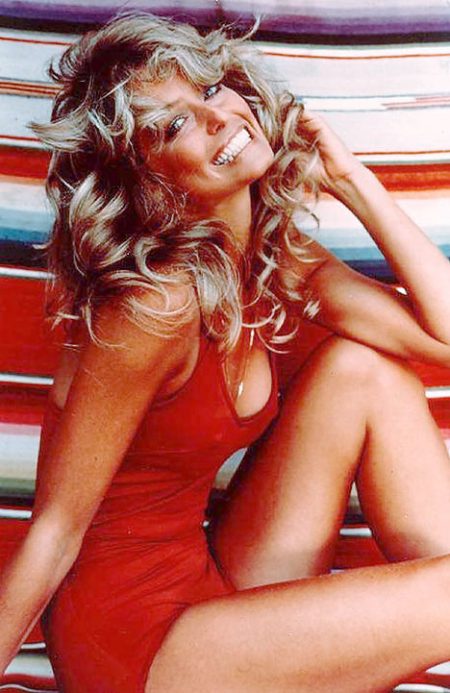
By Valerie J. Nelson
9:51 AM PDT, June 25, 2009
Farrah Fawcett, who soared to fame as a national sex symbol in the late 1970s on television's campy "Charlie's Angels" and in a swimsuit poster that showcased her feathery mane and made her a generation's favorite pinup, died today at 62, according to Reuters.
Fawcett, whose celebrity overshadowed her ability as a serious actress, was diagnosed with a rare anal cancer in 2006.
Three months after she was declared cancer-free in 2007, doctors at UCLA Medical Center told her the cancer had returned, spreading to her liver, and she repeatedly sought experimental treatment in Germany.
As an actress, Fawcett was initially dismissed for her role as Jill Munroe in "Charlie's Angels," one of the "jiggle" series on ABC-TV in the late 1970s.
But she transformed her career and some popular perceptions in 1984 with "The Burning Bed," a television movie about a battered wife that brought her the first of three Emmy nominations. She further established herself as an actress in the play and later feature film "Extremities," about a rape victim who takes revenge on her attacker.
For many, the poster of her wearing a wet one-piece swimsuit and a blinding smile endured.
"If you were to list 10 images that are evocative of American pop culture, Farrah Fawcett would be one of them," Robert Thompson, a professor of television and popular culture at Syracuse University, told The Times. "That poster became one of the defining images of the 1970s."
Yet Fawcett was part of a new generation of celebrities whose fame was fueled by heightened coverage of their ongoing personal dramas, Thompson said.
She had many: a failed marriage to actor Lee Majors; a stormy, long-term relationship with actor Ryan O'Neal; a son who fought drug addiction; a writer-director boyfriend, James Orr, who was convicted of assaulting her; a Playboy video that featured her using her naked body as a paintbrush; and a spacey 1997 appearance on David Letterman's late-night TV show that caused critics to question her mental state.
For her part, Fawcett once said all she had to do to get on the cover of People was to "have a new boyfriend or even a new dog," Texas Monthly reported in 1997.
At first, her mane nearly eclipsed her fame.
"Charlie's Angels" showcased the long, feathered tresses that framed her face, launching a national fad of copycat haircuts. Many Fawcettphiles believed the hair had as much to do with the poster's sales as anything, The Times reported in 1977.
Within six months, the poster sold five million copies, outstripping the records of such previous sex symbols as Betty Grable and Marilyn Monroe. It wound up selling a reported 12 million copies.
"You were a real man if you had her poster. She was our pinup girl," Mike O'Meara, a radio show host who was in high school when it came out, told the Baltimore Sun in 2006.
Fawcett quit the series that brought her initial fame in 1977 after a single season, saying producers were preventing her from growing as an actress. With Kate Jackson and Jaclyn Smith, Fawcett had played a private investigator whose main talent seemed to be the ability to wield a gun while going braless and shouting, "Freeze, turkey!"
"Charlie's Angels" was so popular that 59% of the television audience tuned in, according to Time magazine, and the Los Angeles Times' review of the series premiere pointed out why: The show dripped with "sexuality" and "good-natured but quite intentional teasing."
Along with "Three's Company" -- a double-entendre-filled ABC sitcom that debuted six months after "Charlie's Angels" in fall 1976 -- the show is credited with helping to launch television's "jiggle" era. Still, the show was seen as empowering women, even if they did take their orders from an unseen male boss named Charlie.
"In an odd way, even with all that Lycra and bralessness, the show was a feminist statement," Thompson said. "This was an hourlong drama with women as action heroes. They were working in areas of power that generally we didn't see women in much."
Fawcett, who had appeared in shampoo ads, would triumph over critics who dismissed "Charlie's Angels" as little more than a commercial for hair products. But first she appeared in two lightweight feature films: "Somebody Killed Her Husband" (1978) and "Sunburn" (1979).
She surprised critics with her intense portrayal of the battered wife who immolates her husband in the TV movie "The Burning Bed." The 1984 Times review noted her "growing acting skill" and "deeply moving performance."
More